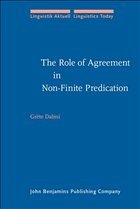Nicht lieferbar

The Role of Agreement in Non-Finite Predication
Versandkostenfrei!
Nicht lieferbar
Main description:This comparative syntactic study claims that agreement is the most central functional category responsible for licensing predication in finite, non-finite and small clauses alike. Intriguing syntactic phenomena like Icelandic infinitival predicates taking non-nominative (quirky) subjects; psych-impersonal and modal predicates in Italian, Hungarian and Russian; meteorological predicates, existential clauses, post-verbal and null subjects in the so-called null-subject VSO languages can all be better analyzed through a concept of predication that is closely related to AGRP, manif...
Main description:
This comparative syntactic study claims that agreement is the most central functional category responsible for licensing predication in finite, non-finite and small clauses alike. Intriguing syntactic phenomena like Icelandic infinitival predicates taking non-nominative (quirky) subjects; psych-impersonal and modal predicates in Italian, Hungarian and Russian; meteorological predicates, existential clauses, post-verbal and null subjects in the so-called null-subject VSO languages can all be better analyzed through a concept of predication that is closely related to AGRP, manifesting subject-verb agreement. The overt agreement marking in Hungarian and Portuguese infinitival clauses further strengthens this view. Obviation and control subjunctive clauses in the Balkan languages, Welsh finite and non-finite infinitival clauses as well as case-marked secondary predicates in Icelandic, Slovak, Hungarian, Russian and Finnish also lend support to an analysis where the [+pred] feature is checked in AGRP.
Table of contents:
- List of abbreviations
- List of cases in Hungarian
- Acknowledgements
- Foreword
- 1. Finiteness and minimalist theory
- 2. Two theories of predicstion without AGRP
- 3. AGR-based theories of grammar
- 4. AGRP in infinitival clauses
- 5. AGRP in other forms of non-finite predication
- 6. Conclusion
- References
- Index
This comparative syntactic study claims that agreement is the most central functional category responsible for licensing predication in finite, non-finite and small clauses alike. Intriguing syntactic phenomena like Icelandic infinitival predicates taking non-nominative (quirky) subjects; psych-impersonal and modal predicates in Italian, Hungarian and Russian; meteorological predicates, existential clauses, post-verbal and null subjects in the so-called null-subject VSO languages can all be better analyzed through a concept of predication that is closely related to AGRP, manifesting subject-verb agreement. The overt agreement marking in Hungarian and Portuguese infinitival clauses further strengthens this view. Obviation and control subjunctive clauses in the Balkan languages, Welsh finite and non-finite infinitival clauses as well as case-marked secondary predicates in Icelandic, Slovak, Hungarian, Russian and Finnish also lend support to an analysis where the [+pred] feature is checked in AGRP.
Table of contents:
- List of abbreviations
- List of cases in Hungarian
- Acknowledgements
- Foreword
- 1. Finiteness and minimalist theory
- 2. Two theories of predicstion without AGRP
- 3. AGR-based theories of grammar
- 4. AGRP in infinitival clauses
- 5. AGRP in other forms of non-finite predication
- 6. Conclusion
- References
- Index




